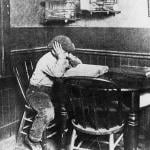FRIENDS IN NEED: At the pregnancy center, we see how certain norms which are destructive for everyone, but which may make some utilitarian sense from an upper-class perspective, have filtered down to poor women. The most obvious one is the idea that marriage is the final stamp of approval on a life well lived, the last item on the to-do list, to be checked off only once you’ve achieved economic stability. Marrying before economic stability has been achieved is actively stigmatized, because economic independence and stability are major markers of grown-up status, and the new model of marriage is that you complete the growing-up process first rather than letting your marriage form the bedrock of your adult identity.
You can see how this causes difficulties when economic stability is a far-off goal which may never be achieved. (And which becomes even harder to achieve once you start having kids out of wedlock.) Marriage is simultaneously an immensely longed-for honor and an endlessly-receding finish line.
What I didn’t notice until more recently is that destructive upper-class norms of friendship may also be changing poor communities. This study basically argues (this is from memory, so I apologize if I misstate anything) that upper-class friendships are looser, based on common interests and personal compatibility, easier to shrug out of, and less tightly-tied to mutual aid, while working-class friendships are nosy, impose sometimes burdensome obligations, and are based mostly on proximity or similarity of life situation. Looser friendships offer independence, but are prone to atomization and alienation; tighter friendships foster generosity, but are prone to gossip and to resentment when perceived obligations aren’t met.
I’ve been struck recently by how many of my clients are ashamed to go to their friends for help: both material or financial help, and emotional support, the love in time of distress which might be thought of as one of the key purposes of friendship. I’ve written before about my own struggle with the temptation to keep my troubles to myself and not seek help because I don’t want to burden others, so I totally sympathize with this dilemma. But as I’m trying to teach myself, love in a time of need is what you have friends for. St. Aelred’s emphasis on transparent honesty with one’s friends may be considered an antidote to the shame we feel at exposing our own needs and weaknesses.
One of the biggest tasks at the center, at least for someone with my style of counseling, is to help the woman find the sources of love and support already available to her in her own life and community. I try to help her identify and strengthen those connections. And I’ve been startled by how often people will identify a friend as a possible source of desperately-needed strength, and then admit that they’re ashamed to rely on that friend. “Well, if she were in need, wouldn’t you want to know?” I ask, and that helps a bit. But the tight old relationships–not only friendship but the fictive kinship relations of godparenthood and godsisterhood, and maybe even the extended-family relationships of cousinhood–seem to be weakening. A renewal of friendship would be good for everybody, but maybe especially good for the poor.















